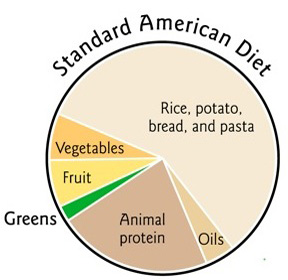 Did you know that most medical doctors don’t know much about nutrition? It’s true. Maybe they’ve taken a class in medical school about the basics and, unless they pursue nutrition further, they really don’t learn much about it. As a result, they often tell their patients that if they eat a “balanced” diet, that’s all they need to maintain good health. This advice is at best naïve in our modern, toxin-laden environment and at worst, dangerous. Especially for people who have very specific nutritional needs. Let me explain…
Did you know that most medical doctors don’t know much about nutrition? It’s true. Maybe they’ve taken a class in medical school about the basics and, unless they pursue nutrition further, they really don’t learn much about it. As a result, they often tell their patients that if they eat a “balanced” diet, that’s all they need to maintain good health. This advice is at best naïve in our modern, toxin-laden environment and at worst, dangerous. Especially for people who have very specific nutritional needs. Let me explain…
A Balanced Diet Is Not Enough for Boomers
Recent research has shown repeatedly that the Boomer-aged population – the largest in the world – most often has nutritional deficiencies that put them at risk for developing the typical diseases and ailments of this age group. Why?
Many Boomers grew up being told by their doctors if they followed the “standard American diet” (SAD) that all their nutritional needs would be taken care of. As a result, many Boomers have lived a lifetime in chronic nutrient deficiency. Back in the 1950’s through 1960’s (the Boomer formative years), the typical American diet consisted of little fruits and vegetables, too much sugar and fat, and a lot of carbohydrates. Years later those chronic nutritional deficiencies start showing up in many diseases and chronic ailments that often plague the older age group. For example:
1. Vision problems: Chronic Vitamin A, collagen, C, E, lutein deficiencies.
2. Memory, nerve issues, fatigue: Chronic B vitamin deficiency, especially B12. Decreased absorption of B12 in the gut can begin, as early as age 30 and by age 50, is B12 deficient. Also, inadequate protein, magnesium, and essential fatty acids may be deficient.
3. Weight gain, type 2 diabetes, and metabolic syndrome. May be caused by inadequate chromium, protein, and probiotics from foods.
4. Joint/muscle aches and pains. May be caused by too little Vitamin C, magnesium essential fatty acids.
5. Chronic infections, allergies. May be caused by too little “good bacteria” in intestinal flora.
The Best Nutrients for Boomers
Back in the 50’s-60’s, doctors didn’t know how important certain vitamins and minerals would be to your future health, independence, and stamina. Today in 2013, we know a lot more about how nutrients both prevent and heal diseases and chronic ailments. While it’s a good idea to get as many nutrients from your food as possible, even the best grown foods don’t contain as many vitamins and minerals as they did a century ago. Research out of the Council for Responsible Nutrition in Washington D.C. has shown that nutritional supplements can really help prevent disease and promote health especially in the Boomer age groups. Focus on these:
1. Vitamin A: Prevents degenerative eye diseases, protects skin. Recommended Level: 3,500-5,000 beta carotene daily.
2. B vitamins: Supports cellular energy, nervous systems, hair, skin, and nails. You need the full array of B vitamins in a supplement. B12 should be about 400 mcg per day or ask your doctor about monthly B12 injections. Have your B12 levels tested by a simple blood test.
3. Vitamin C: 500 to 1,000 mg daily. For immune function, maintaining skin, joint health.
4. Vitamin D3: Essential to bone health and immune function, 1,000 IU a day.
5. Chromium: 200 mcg a day for men and women over 50. If you have type 2 Diabetes or metabolic syndrome, 400-800 mcg a day may provide additional help with insulin sensitivity.
6. CoEnzyme Q 10/Ubiquinol: For cellular energy, heart health, 90-120 mg daily.
7. Essential fatty acids: Otherwise known as Omega-3 fats, found in nuts, flax seeds, fish and krill oil. Fights inflammation throughout your body. 1,000-2,000 mg a day.
8. Lutein, Lycopene, zeaxanthin: Important carotenoids for eye, prostate and colon health. Lutein 10 mg, zeaxanthin 4 mg, lycopene 5-15 mg or 15,000 IU daily of mixed carotenoids that includes these. *Note: Research suggests too much lycopene may worsen prostate cancer.
9. Minerals: Magnesium 500 mg a day, zinc 9 mg a day for women, 11 mg for men. Magnesium helps cardiovascular and nervous health. Zinc promotes healthy hormones.
10. Probiotics: Should contain Bacillus coagulans or lactobacillus GG, one capsule daily. Helps maintain good intestinal flora to fight disease and absorb nutrients better from food.
You may have had a lifetime of nutrient deficiencies from a not-so-optimal diet. Now that you’re older, your metabolism has likely slowed some and you’re not absorbing enough critical nutrients. Supplementing a good diet with extra nutrients is the best way to ensure against deficiencies that can put you at higher risk for ailments as you age.
Stay Well,
Mark Rosenberg, M.D.
http://intmedny.com/blog/2013/05/26/baby-boomers-are-vitamin-supplements-really-necessary/
